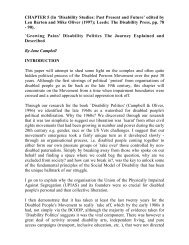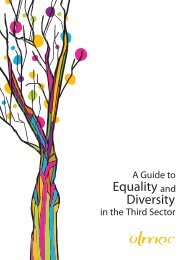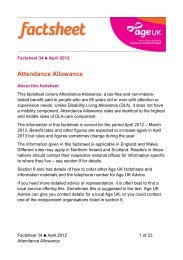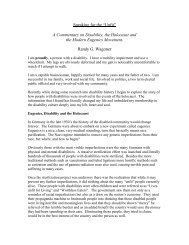What equality law means - Birmingham Disability Resource Centre
What equality law means - Birmingham Disability Resource Centre
What equality law means - Birmingham Disability Resource Centre
Create successful ePaper yourself
Turn your PDF publications into a flip-book with our unique Google optimized e-Paper software.
For example:<br />
An employer has recruited a worker who is a wheelchair user and who would have<br />
difficulty negotiating her way around the office. In consultation with the new worker,<br />
the employer rearranges the layout of furniture in the office. The employer has made<br />
reasonable adjustments.<br />
Providing extra equipment or aids<br />
The third requirement of the duty involves providing extra equipment – which <strong>equality</strong> <strong>law</strong><br />
calls auxiliary aids – and auxiliary services, where someone else is used to assist the<br />
disabled person, such as a reader, a sign language interpreter or a support worker.<br />
An auxiliary aid or service may make it easier for a disabled person to do their job or to<br />
participate in an interview or selection process. So you should consider whether it is<br />
reasonable to provide this.<br />
The kind of equipment or aid or service will depend very much on the individual disabled<br />
person and the job they are or will be doing or what is involved in the recruitment process.<br />
The disabled person themselves may have experience of what they need, or you may be<br />
able to get expert advice from some of the organisations listed in Further sources of<br />
information and advice.<br />
Making sure an adjustment is effective<br />
It may be that several adjustments are required in order to remove or reduce a range of<br />
disadvantages and sometimes these will not be obvious to you. So you should work, as<br />
much as possible, with the disabled person to identify the kind of disadvantages or<br />
problems that they face and also the potential solutions in terms of adjustments.<br />
But even if the disabled worker does not know what to suggest, you must still consider<br />
what adjustments may be needed.<br />
For example:<br />
A disabled worker has been absent from work as a result of depression. Neither the<br />
worker nor their doctor is able to suggest any adjustments that could be made.<br />
Nevertheless the employer should still consider whether any adjustments, such as<br />
working from home for a time or changing working hours or offering more day-to-day<br />
support, would be reasonable.<br />
You may be able to get expert advice from some of the organisations listed in Further<br />
sources of information and advice.<br />
56














